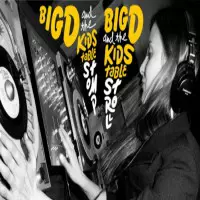Here's the line: If you think that the artistic growth Boston's act Big D and the Kids Table exhibited from Good Luck through Fluent in Stroll yielded some of the best ska records released in the new millennium, you will be wicked stoked on their new double album, split up Use Your Illusion-style as Stomp and Stroll. If you disagree, well then why are you reading about a ska band in 2013?
Now that it's just us, let's get all kinds of specific. If I might be mesquite bold, I'd like to suggest that Big D's albums How It Goes, Strictly Rude and Fluent in Stroll form a kind of trilogy. How It Goes was the culmination of the band's ska-punk roots. Stuff like Good Luck and Gipsy Hill showed promise; How It Goes promises a show. Strictly Rude examined the genre's past; Fluent in Stroll examined its future. All three are ridiculously fun listens.
Which is why some folks were bummed out by 2009's For the Damned, the Dumb & the Delirious. It was a ska-punk throwback that emphasized the punk side, and it felt like a huge creative retread. How It Goes was perfect, but it also can't be repeated. Stomp and Stroll rehash Strictly Rude and Fluent in Stroll, but with generally better results.
Admittedly, frontman David McWane has talked in the past about doing a double album of crowd pleasures and stroll tunes (a genre the band invented that blends "double-dutch, ska, reggae and soul"). But given the albums' similarities to each other, it's hard not to see these new releases as another retread, albeit a more successful one.
Stomp is a really fun record. Tons of horns and melodies. Lyrics about drankin' and/or people who suck. But mostly, it's just fun, even when it comes too close to previous successes like "Checklist" or "Shining On." No matter how down McWane and his friends get, they always keep their energy up. "Stepping Out" burst with sunny ska pep, announcing a return to form. Also it's about fucking around at work, which is quintessentially D. "Shit Tattoos" is a hilarious yet rocking anti-tribute to a shitty tattoo parlor. Bonus points for naming the proprietor "Terry," in the grand ska tradition. "Social Muckary" is another skanker before "Pinball" cools things down, essentially serving the same purpose as "Shining On" did on Strictly Rude. That song is an anomaly overall, however.
The big difference between Stomp and Strictly Rude is in the jamming. Rude had a bit of it scattered around its second half; Stomp rarely strays from its horn-heavy bounce. At 38 minutes, the record is tight enough to make that work, which reveals the brilliance in splitting up this double album. Stomp gets to focus almost entirely on two-tone, occasionally broken up by something like the spitfire songs "Static" or "Pitch ân' Sway." By itself, Stomp would have made 2013 a banner year for Big D. Stroll tarnishes that notion.
Stroll is essentially Fluent in Stroll Part 2: Back into Stroll. It's markedly different from Stomp and the general D sound. This record emphasizes a jammier atmosphere. The Doped Up Dollies, McWane's backup singers, return in a more prominent role, taking lead duties on songs like "Drink Me Down" and "What I Got." But the band's fusion ideas get a little too on the nose. I know they wanted to incorporate double-dutch into stroll, but the band didn't really need to straight up reference schoolyard chants.
Stroll isn't without its charms–the haunting "Moment of Weakness" is particularly affecting–but compared to Stomp, it just don't deliver. At 50 minutes, this second set feels a little flabbier, a little less focused. Granted, it was always going to be a cult record, as Fluent divided the band's fanbase at the time of its release as well. But the songs just don't sparkle the same.
The silver lining here is that fans can pick and choose which version of the D they want to hear at a better price. The difference between the two albums can be summed up thusly: Stomp could be played concurrently with Strictly Rude; Stroll sounds like Fluent outtakes.
